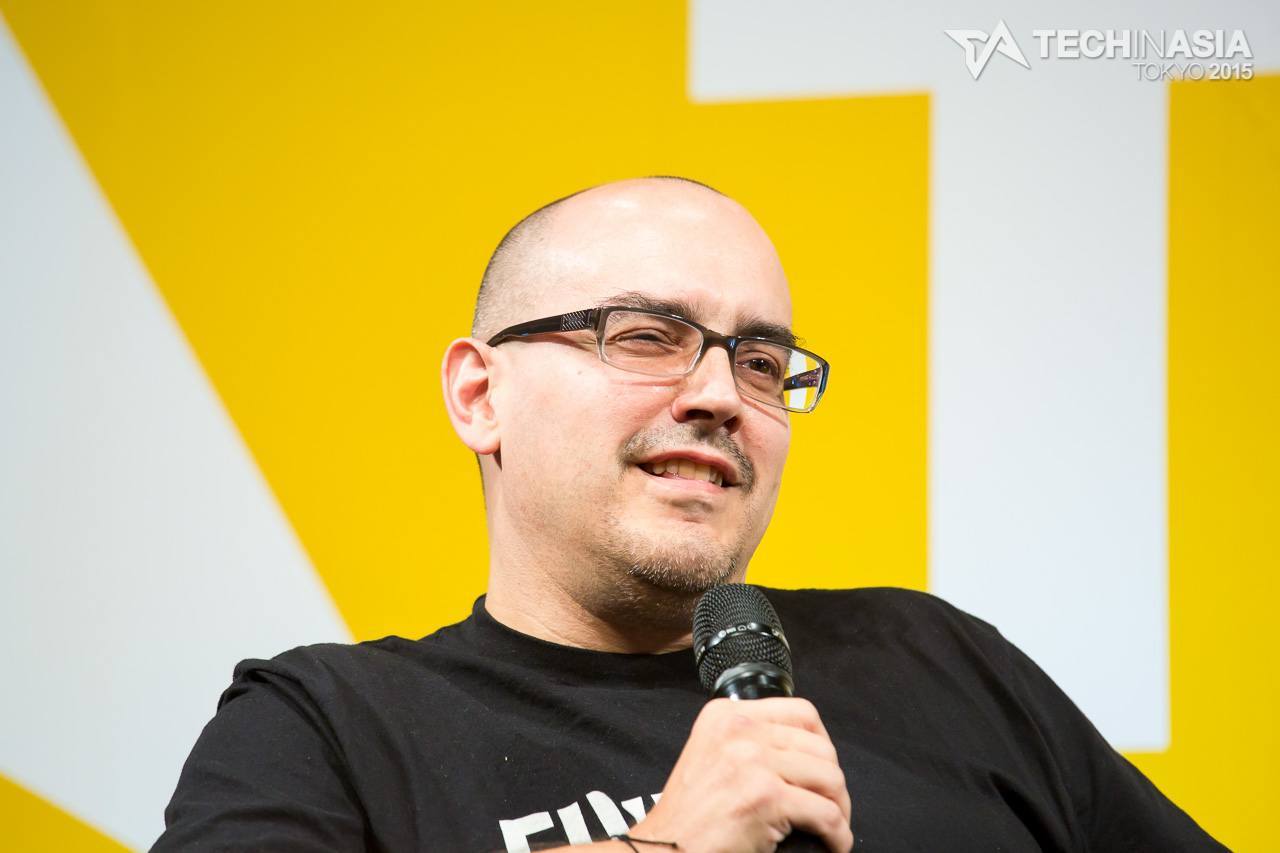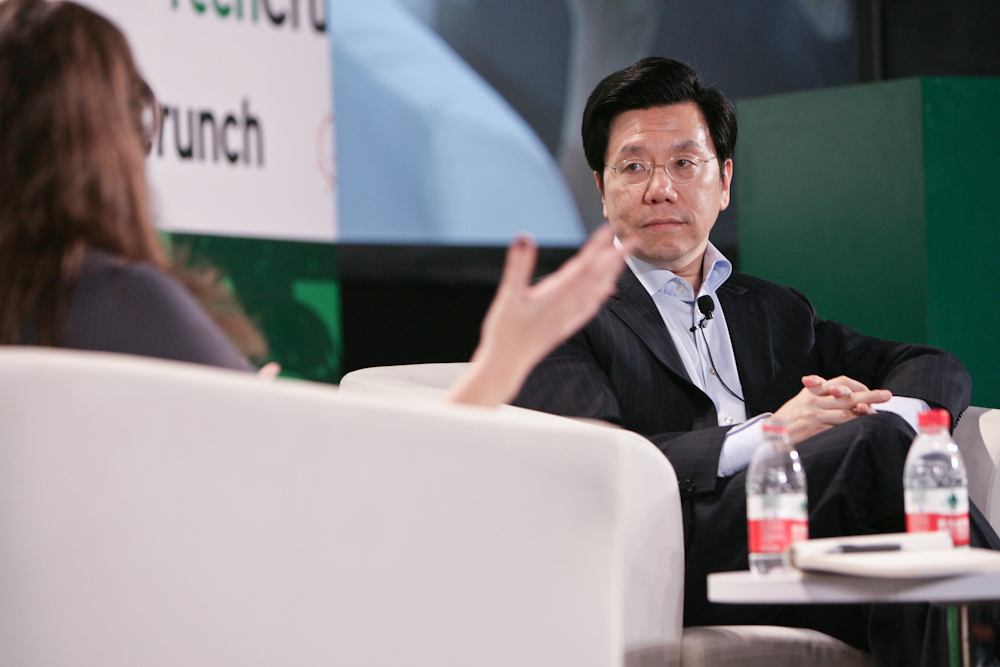One of the most important bits of homework an entrepreneur can do while fundraising is reading up on VCs, so that they can approach only the people most relevant to their business. With that in mind, here’s a list of the highlights among Asia’s new funds in 2016.
Southeast Asia
With all the barriers to business in this fragmented region, startup valuations are low. Now is still a prime time for startups to enter without being too late, creating an environment that’s desirable to investors from around the world.
500 Durians
500 Startups’ Southeast Asia war chest has been open since 2014 – and this year it got larger with an extra US$50 million, its second fund, for the US’ VCs usual focus on startups making consumer apps.

500 Startups’ Dave McClure speaking at TIA Tokyo 2015. Photo credit: Tech in Asia.
500 Durians II will sign checks worth US$50,000 to $150,000 for about 200 seed-stage companies in the region. Plus, it might invest an additional US$500,000 in those showing exceptional progress, says ebullient boss, Khailee Ng.
Fenox
Another established name, Fenox topped up with US$20 million this month.
The newest fund, courtesy of cash from Taiwanese contract manufacturer Wistron, is aiming at robotics, artificial intelligence, big data, so-called Internet-of-Things (IoT), healthtech, and fintech among Asian and American startups.
Cocoon Capital
This is a new name from two renowned angel investors, William Klippgen and Michael Blakey.
With US$7 million in the bank in Singapore, it’ll fund US$250,000 to $700,000 a pop in Southeast Asia and India with a preference for software-as-a-service, ecommerce, and fintech startups.
Jungle Ventures
Jungle’s second fund, weighing in at US$100 million, has already invested in a few startups across Southeast Asia, such as Pomelo and Tradegecko.
The investment firm will lead in larger series A and B rounds, targeting primarily Southeast Asia, but also India and Australia. Deals range from US$3 to $5 million per company.
Rakuten Ventures
The Japanese ecommerce titan’s VC arm got US$100 million more in muscle in April, doubling its Global Investment Fund to US$200 million.

Saemin Ahn onstage at TIA Singapore 2015. Photo credit: Tech in Asia.
Based in Singapore and Tokyo, Rakuten Ventures goes after consumer tech startups (as evidenced by its backing Carousell) as well as services that are popular with app-making startups (like push notifications system OneSignal).
Vickers Ventures
With a target size of US$250 million for its fifth fund, it’s one of the largest in Singapore – or the entire region. Vickers invests mainly in consumer tech, media, telecommunications, financial services, and life sciences including healthcare and medicine.
The firm’s investments usually range from US$1 million to $12 million per shot, with more money flowing in with subsequent rounds.
Gobi Ventures & MAVCAP
China’s Gobi Ventures reaffirmed its Southeast Asia ambitions this year with the new and grandly named Gobi MAVCAP ASEAN SuperSeed Fund.
Packing US$15 million and with its HQ in Malaysia, it’ll target seed-stage startups in advertising, big data, cloud computing, connected devices, content and digital media, ecommerce, financial tech, IoT, online tourism, and services related to Muslims.
KK Fund
KK’s second fund, aiming to plough in US$400,000 to $500,000 per investment, is similar to the first one in targeting Southeast Asia, Hong Kong, and Taiwan in ecommerce (particularly marketplaces), fintech, logistics, plus media and entertainment.
Qualgro
Qualgro is a new Singapore-based US$50 million fund with an eye on the entire continent.
It leans towards series A and B, around US$750,000 to $3 million, with an emphasis on health, education, logistics, communication, and fintech.
Mandiri Capital Indonesia
Hopping over to Indonesia, banking giant Mandiri set up its new VC at the start of the year with US$25 million.
MCI will inevitably focus on fintech startups.
Ruvento
Ruvento Seed II fund will throw US$50,000 to $500,000 at startups in the US, China, and Singapore building hardware, smart home tech, wearables, robotics, 3D printing, AR, and VR.
See: Here’s an exhaustive map of VC funding in Singapore
Capitaland’s C31 Ventures fund
Real estate group Capitaland has put US$74 million into this. With US$11 million devoted just to Singaporean startups, the Singapore government will contribute US$7.3 million to co-invest under the ESVF program.
Unsurprisingly, there’s a real estate slant to its interests, with startups engaged in things like design and construction, sales and leasing, and smart home tech a particular focus. Workplace productivity and customer engagement are also on the radar.
This year saw a bunch of other new corporate funds spring up, such as Declout, Wilmar, and YCH, which have backing from Singapore’s NRF.
Razer’s zVentures fund
Here’s another corporate one – from the gaming hardware mavens at Razer. It has the hots for startups working on robotics, IoT, software and analytics, advanced manufacturing and engineering, gaming software technology, VR and AR, eSports, and robotics for this US$30 million fund.
“In addition to providing capital, we help our companies interface with Razer, by allowing them access to Razer’s network of suppliers and OEMs, customers and investors, as well as meet other stakeholders, industry leaders and influencers,” according to the new, dedicated website for zVentures.
India and South Asia
After the feeding frenzy of 2015, India saw a quieter and more chastened 2016 as VCs, balking at stratospheric valuations, dished out cash in a much more frugal fashion.
While major investors like Tiger and Softbank steered clear, other big names still secured new funds – although it doesn’t mean they’re about to spend the cash willy-nilly.
Sequoia India
The Ola and Freecharge investor marked its ten-year India-versary with more new capital than any other VC in the nation. Sequoia’s suitably stout new India fund amounted to US$920 million.
Reliance Jio Digital India Startup Fund
This new purse filled with US$748 million, created by India’s telecommunications giant, is a vote of confidence for India’s wired future in the same year that Reliance rolled out India’s first nationwide 4G network.

A smartphone user in Kerala, India. Photo credit: Romtomtom.
Norwest Venture Partners
Norwest mustered a third consecutive US$1.2 billion for its lucky 13th fund. Quite a bit of this global war chest will go to India, as it has done before with investments in Swiggy, Yatra, and a number of other well-known names.
Accel India
India’s startup investment slowdown this year didn’t perturb Accel too much, which threw US$450 million into its fifth India fund in November.
The Flipkart investor opens its newest coffers in January 2017.
See: India’s beloved Flipkart had a crappy 2016
Ventureast
Ventureast is back on the early-stage beat with its sixth fund, Ventureast Proactive Fund II, good for US$150 million.
Lightbox
This US$54 million Lightbox expansion fund, announced a few days ago, is designed to support its portfolio companies with some growth-stage cash, but it could also be doled out to some new startups.
Green House Ventures Accelerator
Its newest fund, with money from Japan, is US$52 million for early-stage consumer tech companies in India
Oil and Natural Gas Corporation Fund
India’s Oil and Natural Gas Corporation this year added some tech to its dinosaur juice with a US$15 million startup fund. It’s looking for enterprise startups relevant to the oil and gas industries.
Techcelx
The US$15 million will be ploughed into startups working on machine learning, IoT, AI, analytics, and data science as relevant to banking, education, and healthcare.
Draper Nexus
While 75 percent of Draper Nexus’ US$190 million seed fund goes to Silicon Valley, the rest of it will go globally, with an emphasis on Asia. Tim Draper professed enthusiasm for India and Indonesia in particular.
The Draper seed fund will mostly be looking at entrepreneurs building things in fintech, govtech, healthcare, education, insurance, and logistics.
China
China, in contrast to India, saw a rambunctious 2016. Although investors were rather more judicious and cautious than before when it came to backing startups, a flash flood of investment money in the country ensured that VCs were still capable of cobbling together billions in new funds.
Last year’s stock market crash coupled with ongoing restrictions on flipping houses has left retail investors looking for new avenues for sizeable returns – and many turned to investment options that involve tech funds. That prompted one official to warn of “disaster” from a flood of new money into startup investing, creating the risk of a sudden bubble.
Lenovo Capital
Arguably the biggest newcomer this year – in terms of cash and name recognition – is Lenovo. Clutching US$500 million, the new VC arm will boost Chinese and global startups doing both consumer and enterprise tech.
GGV Capital
GGV Capital, backer of Alibaba and Airbnb, is freshly minted with US$1.2 billion for tech teams in the US and China.

GGV’s Jenny Lee. Photo credit: GGV Capital.
The money is spread across four of its piggy banks – GGV Capital VI, VI Plus, VI Entrepreneurs’ Fund, and GGV Discovery Fund.
Matrix Partners
For its fourth fund, Matrix has come up with US$500 million. That’s in addition to its first ever yuan-denominated fund, worth US$75 million.
Lightspeed China
Lightspeed’s third injection has US$260 million for its usual wide interests in tech. On the RMB side, that also got a US$75 million top-up.
Qiming Venture Partners
Qiming’s fifth US dollar fund totalled US$648 million, while its fourth RMB fund hit US$222 million.
DCM Ventures
For fund number eight, DCM has US$500 million at its disposal, mainly for bets of US$5 million to $10 million. “AI, messaging platforms, software-as-a-service, drones, virtual reality, and cross-border technology” are now on its radar, says co-founder David Chao.
The VC generally concentrates on the US and China, but it has also backed firms in Japan and South Korea.
Sinovation Ventures
With Sinovation Fund III and Sinovation RMB Fund III, the VC created by former Google China boss Kai-Fu Lee has an extra US$374 million in Chinese currency plus US$300 million in greenbacks.

Kai-Fu Lee (right) pictured in 2011 in an interview with Sarah Lacy. Photo credit: TechCrunch.
AI, enterprise software, and entertainment content will get to the front of the queue.
IDG China
The IDG China Capital Fund III brings with it a whopping US$1 billion for Chinese startups or for anyone looking to go big in China. An early investor in Xiaomi and Tencent, it’s keen on startups in all development stages.
SBCVC
What Softbank China Venture Capital Fund V lacks in brevity it makes up for in cash: a brand-new US$459 million. The Japanese giant, which made a fortune on its early Alibaba investment, generally goes in earlier rather than later.
Joy Capital
An all-new name from Legend Capital’s Liu Erhai, Joy Capital Fund has US$200 million, mainly for participating in fairly large later rounds – as evidenced by its bets on auto-maker NextEV and on the series C for a Chinese app similar to Airbnb.
Cocoon Networks
London-based Cocoon Networks, a spin-off from a major Chinese investment firm, is ready to dish out US$715 million to European startups with big potential in China.
Medical, fintech, biotech, and fashion tech are among its preferences.
1955 Capital
Similar to Cocoon Networks, 1955 Capital is taking American and European startups into the vast – and very tricky – China market.
Targeting “all the save-the-world stuff, instead of what’s hot,” this new VC is going after green technologies in energy, food, and agriculture.
Dragon Egg Fund
This is aimed at Australian startups looking to tap into China. Launched by Mai Capital, it has US$14 million for late seed to series B rounds in logistics, healthcare, clean-tech, education, and agriculture.
Japan and East Asia
Japan and Korea might be synonymous with Sony and Samsung, but their fast-growing startup ecosystems are proving that new names and new ideas are keen to emerge. Both nations had a milestone year in tech entrepreneurship, not least thanks to the huge IPO for messaging app Line, which debuted with a US$9 billion valuation.
Global Brain
Global Brain’s sixth fund, crammed with US$175 million, is earmarked for startups in Japan, Silicon Valley, South Korea, Southeast Asia, and Israel.
It’s after startups plying hardware, IoT, robotics, education, enterprise solutions, and commerce solutions.
UTokyo Innovation Platform
University of Tokyo, established in 1877, set up its first ever fund in September with US$230 million. It’ll back “startups in pharmaceuticals, materials, and other fields with long timelines that tend to deter private investors,” reported Nikkei.

Photo credit: Moyan Brenn.
The UTokyo Innovation Platform, as it’s dubbed, will reserve 60 to 70 percent of the total for startups with roots at the school in drug and materials development. The rest goes to a partner VC that invests in UTokyo-affiliated startups in AI and robotics.
Rakuten Ventures Japan
In January, Rakuten Ventures also added US$75 million to its Japan Fund, aimed at early and growth-stage startups in its home nation.
Geodesic
Silicon Valley-based Geodesic Capital unleashed its first fund this year with US$335 million. It’ll go to growth-stage companies looking to enter markets across Asia.
Japan is a particular focus because of the people and firms behind Geodesic Capital Fund I, such as former US Ambassador to Japan John V. Roos and Mitsubishi.
Each investment will range between US$5 to $30 million
Globis Capital
With its fifth fund, Tokyo’s Globis has US$135 million more for early, expansion, and late-stage investments primarily in Japan.
The focus is the same as its previous funds: consumer apps and startups, health care, medical services, and retail.
Beyond Next Ventures
Focusing on Japan, the latest fund, worth US$42 million, continues the search for very industry-specific startups – like medical, robotics – coming out of the country’s top universities.
IMJ
The Singaporean VC is zooming in on Japan with this new US$52 million fund. It’ll mainly contribute to startups in stages above series A, with a kink for banking, healthcare, education, and security.
Skyland Ventures
For its second fund, Skyland Ventures has gathered US$10 million to invest in 30 startups. VR, AI, movie communication, and robotics are the focus.
ABBA Lab
Mamma mia! ABBA Lab, a startup incubator focusing on IoT, expanded with a US$14 million fund in May for smart gadgets and services.
D4V
California’s IDEO, a major design firm, buddied up with Tokyo-based VC firm Genuine Startups for this brand-new venture. Its US$50 million will be invested into Japanese startups starting next year.
Nigata Venture Capital
At US$15 million, this niche fund is on the lookout for Japanese businesses working on local problems or starting up outside big cities.
Blockchain Angel Fund
It’s small at US$420,000, but we can’t leave out cryptocurrencies. Japanese bitcoin exchange BitFlyer is the creator, seeking out seed-stage investments.
Asics
Yes, this is the sneakers brand, maker of my favorite Onitsuka Tiger kicks. It opened a US$28 million kitty in November aimed at sports-related startups at home and abroad.
Altos Ventures
Over in South Korea, Altos Ventures’ second fund has US$110 million to invest exclusively in the country.

Along the streets in Seoul, South Korea. Photo credit: HB Kang.
Its interests are broad, including Korean teams that can go global, and it’s looking to bulk up on healthcare and fintech as well.
Korean government’s biotech fund
It might lack a snappy name, but the fund has US$68 million for startups working on biotech, particularly stem cell and gene therapy.
SB Next Innovation Fund
Korean web giant Naver has united with SoftBank Ventures for this, coming up with US$43 million for media content of all varieties, from webtoons to mobile games. It’s also keen on media-related businesses, especially VR, AR, advertising, video and voice recognition.
Middle East
The region known as Middle East and North Africa tends to get dominated in terms of tech headlines by just two countries – Israel and the United Arab Emirates. That’s no coincidence: the UAE is home to Careem, the world’s newest tech unicorn and a competitor to Uber, while Israel is punching well above its weight with an impressive array of tech businesses.
Aleph
Israel’s Aleph totted up US$180 million for its second stash in September. Consumer and enterprise startups in Israel will receive most of the cash.
Its first US$140 million fund went to 10 companies as the VC tends to focus large-ish bets on startups with evidence of serious traction.
See: $3.6b in funding and $5.4b in exits for Israel’s startups in 2015
500 Falcons
Another appearance from the prolific 500 Startups, this time for the entire Middle East and North African region with the excellently named 500 Falcons.
Video and Arabic content is being particularly encouraged alongside the usual app-making startups.
Also in the neighborhood is last year’s US$15 million 500 Istanbul fund, which missed the opportunity to call itself 500 Turkish Delight.
Vertex Ventures
Vertex Ventures supplemented its US$600 million global fund with a separate US$120 million dedicated to early-stage Israeli startups.

Boardwalk empire: Tel Aviv is at the heart of a startup boom. Photo credit: IsraelTourism.
It’s a boost both to general startups in the nation as well as ones working on infosec, which has become something of an Israeli speciality.
TLV Partners
With a fresh US$115 million, it’s concentrating on early-stage rounds in enterprise software, fintech, cybersecurity, and IoT.
See: 11 unique startups from Israel that raised funding in 2016
Catalyst CEL
A tie-up between Israel’s Catalyst Private Equity and China’s Everbright Bank, it’s building a bridge for Israeli startups to access the China market.
With an extra US$200 million now burning a hole in its pocket, it swings towards tech that shakes up manufacturing, agriculture, healthcare, water, energy, technology, media, and telecommunications. Typical ticket size: US$10 million to $15 million.
OrbiMed Israel Partners
For teams building medical technology, whether hardware or services, OrbiMed’s second Israel fund, worth US$307 million, is a big one to go after.
It’s in addition to the New York-based firm’s newest, US$1 billion global fund.
TURN8
Over in Dubai, TURN8 has US$60 million for seed or early-stage startups in fintech, mobile cloud, edtech, and enterprise cloud solutions.
Thanks to EMPEA for the China data.
This post New funds in 2016 you need to know about appeared first on Tech in Asia.
from Tech in Asia https://www.techinasia.com/new-funds-asia-2016
via IFTTT

No comments:
Post a Comment